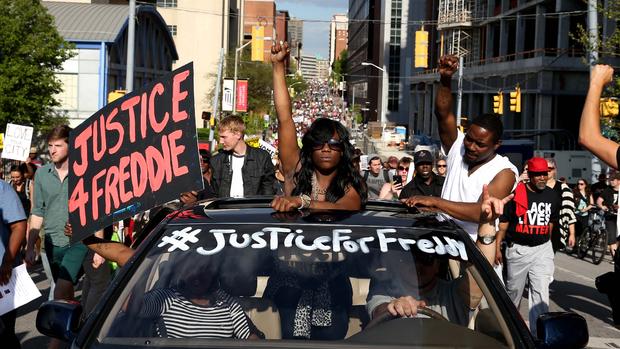Baltimore braces as first Freddie Gray trial closes
BALTIMORE - A jury has begun deliberations in the trial of Officer William Porter in connection to the death of Freddie Gray, a 25-year-old who died from wounds sustained in police custody. The jury has gone home for the day and will resume deliberations Tuesday morning.
Jurors have heard eight days of testimony. Porter is charged with manslaughter, assault, misconduct in office and reckless endangerment. He could face about 25 years in prison if convicted on all of the charges.
Baltimore Circuit Judge Barry Williams told jurors that in order to find Porter guilty of manslaughter they must determine that he acted in a "grossly negligent manner" and "created a high degree of risk to human life."
The judge said the assault charge also requires jurors to find that Porter was grossly negligent, while the misconduct charge requires an "evil motive, bad faith" and "not merely an error in judgment."
Baltimore's mayor said Monday the city is opening an emergency operations center as the trial draws to a close.
Mayor Stephanie Rawlings-Blake said in a letter to community leaders that she has "no doubt" city officials are prepared for anything, but the center will open at 10 a.m. Monday as a precaution. She said it will help agencies coordinate any necessary response. Rawlings-Blake said the city also is communicating with outside law enforcement agency partners.
The mayor said business should continue as usual and people must respect the jury's decision in Officer William Porter's trial.
Prosecutors described Officer William Porter as indifferent to Gray's safety, repeatedly denying him medical care in the police wagon where his neck was broken after he was left handcuffed and shackled but unbuckled on the floor of the van, vulnerable to a serious injury if the brakes were slammed.
The wagon "became his casket on wheels" after Porter failed to belt him to the bench or call for a medic after he was injured, prosecutor Janice Bledsoe said in her closing arguments. Gray was arrested about seven city blocks from the station, and yet police stopped the van repeatedly and the trip became a 45-minute journey.
"With great power comes great responsibility," Bledsoe said. "Porter had the opportunity on four or five occasions to wield his power to save Freddie Gray. He abused his power. He failed his responsibility."
Defense attorney Joseph Murtha countered that nothing more than conjecture and speculation implicates his client.
Gray's death was a "horrific tragedy," Murtha said, but "there is literally no evidence" that Porter caused it.
"The absence of real evidence raises much more than reasonable doubt," Murtha told jurors. "This case is based on rush to judgment and fear. What's an acronym for fear? False evidence appears real."
Porter faces up to 25 years in prison if convicted of all charges.
He testified that he did nothing wrong to Gray, who was arrested after running from officers in his neighborhood.
The mayor said in a letter to community leaders that she has "no doubt" city officials are prepared for anything.
Demonstrations were initially peaceful following the young black man's death on April 19, a week after his arrest. But unrest broke out on the day of his funeral, bringing a curfew and the National Guard to the streets, and fueling the "Black Lives Matter" movement that has increased scrutiny of how police treat minorities.
In Porter's case, an officer's negligence, rather than any violent act or excessive force, is in question. In American jurisprudence, with no eyewitnesses telling what happened inside the van and no unequivocal evidence showing exactly when his neck was broken, legal experts have said this could be difficult to prove.
Prosecutors said the driver, Caesar Goodson, initially stopped because Gray was acting out inside the passenger compartment. Officers bound him more tightly at the wrists, shackled his ankles and laid him on his stomach on the floor.
The van stopped three more times as officers checked on Gray, including one stop in which Porter opened the van's doors and lifted Gray from the van floor to the bench.
Prosecutors say Gray was gravely hurt at this point; Porter denied this, saying Gray wasn't exhibiting any symptoms and appeared uninjured. In any case, the van detoured to pick up another prisoner in a separate compartment before Gray finally arrived at the station in critical condition.
Prosecutors said Porter is partly responsible because he ignored a departmental policy requiring officers to buckle prisoners in seat belts, and didn't call for an ambulance when Gray indicated he needed medical aid.
Porter told jurors he didn't call a medic because Gray didn't show signs of injury, pain or distress, and said only "yes" when he asked if he'd like to go to the hospital. He testified that he told Goodson to take him there, because while he still didn't believe Gray was really hurt, he knew the jail would reject a prisoner claiming injury. He told investigators that Gray had been kicking inside the van at a previous stop, and "he didn't appear hurt in any way, shape or form."
Other witnesses also testified that Goodson was responsible for buckling Gray to the bench. He faces the most serious charge of the six officers: second-degree "depraved-heart" murder.
Porter's fate may influence the trials of the other officers and set the tone for the city's healing.
Police Commissioner Kevin Davis canceled leave for all officers through Friday, saying "the community has an expectation for us to be prepared for a variety of scenarios."
The mayor has urged residents to remain calm.
"Whatever the verdict, we need everyone in our city to respect the judicial process," Rawlings-Blake said. "We need everyone visiting our city to respect Baltimore."
